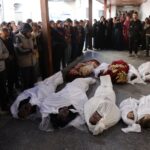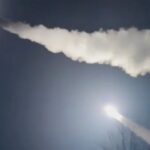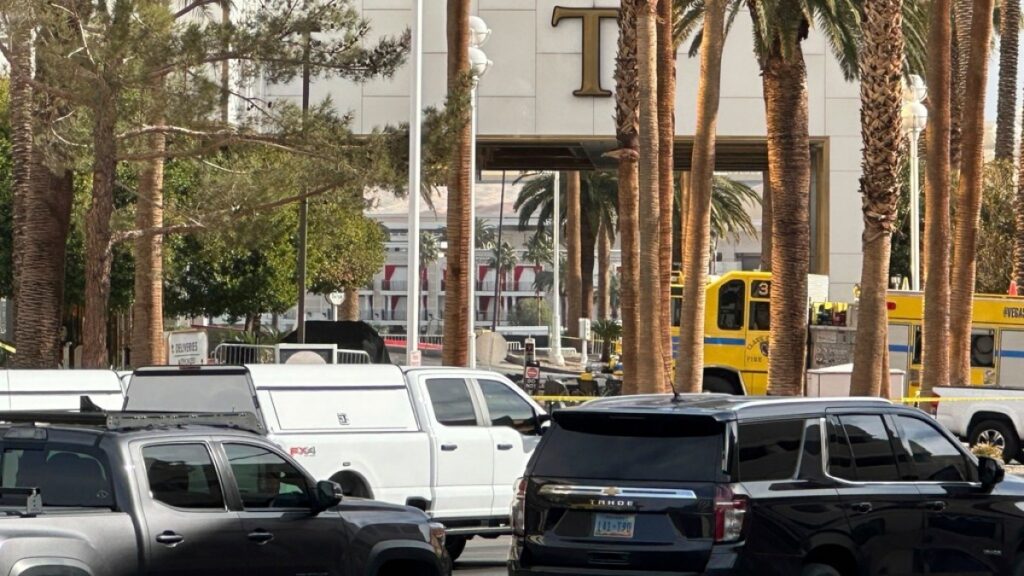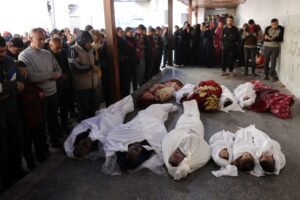
Details have started to emerge about the man killed in the explosion of a Tesla Cybertruck outside of the Trump International Hotel Las Vegas on New Year’s Day.
At a news conference on Thursday, Las Vegas Sheriff Kevin McMahill said that the coroner’s office suggested man died by suicide before the blast.
“The individual had sustained a gunshot wound to the head prior to the detonation of the vehicle,” McMahill told reporters. He added that a handgun was found at the man’s feet.
Earlier in the day, news agencies including The Associated Press and AFP identified the man as an active-duty soldier named Matthew Livelsberger.
Citing unnamed military officials, the news outlets explained that Livelsberger was on leave from his post with the United States Army Special Operations Command.
He was a highly decorated Green Beret who had served in various roles with the US military since 2006, with stints in Afghanistan, Ukraine and Tajikistan, among other locations.
But on Wednesday, Livelsberger was allegedly found dead inside the Tesla Cybertruck burning on the circular driveway outside the hotel’s glass front doors.
Advertisement
Seven other people were wounded when the Cybertruck exploded, and details remain scarce about the circumstances surrounding the blast.
Kenny Cooper, a special agent for the the US Bureau of Alcohol, Tobacco, Firearms and Explosives, expressed surprise that a military member was involved in the explosion, which did little damage except to the Cybertruck.
“The level of sophistication is not what we would expect from an individual with this type of military experience,” Kenny Cooper said.
Early investigations indicate the Cybertruck has been carrying fireworks and camp fuel cannisters when it exploded.
The Trump International Hotel Las Vegas is named for President-elect Donald Trump, a co-owner of the property who is set to take office for a second term in the White House on January 20.
In a brief statement on Thursday, the Federal Bureau of Investigation (FBI) said investigators had searched a home in Colorado in connection to the incident but offered no further details.
“FBI Denver; the Denver Field Division of the Bureau of Alcohol, Tobacco, Firearms, and Explosives; and the Colorado Springs Police Department are conducting law enforcement activity at a residential address in Colorado Springs,” the statement reads.
“FBI Denver personnel and specialized teams will be on-site for several hours. This activity is related to the explosion in Las Vegas on Wednesday.”
The explosion took place on the same day as a deadly car-ramming attack in the southern city of New Orleans that killed at least 15 people, including the suspect.
Advertisement
At least 35 more people were injured in that attack, according to an official estimate on Thursday. That incident is being investigated as a terrorist attack, and improvised explosive devices (IEDs) were allegedly discovered in coolers left on the street at the crime scene.
But authorities have stopped short of connecting the two incidents.
At a news briefing in New Orleans on Thursday, Christopher Raia, a deputy assistant director from the FBI’s counterterrorism division, emphasised he has found no connection so far.
“We are following up on all potential leads and not ruling everything out,” Raia told reporters. “However, at this point, there is no definitive link between the attack here in New Orleans and the one in Las Vegas.”
Law enforcement initially believed that the suspect in the New Orleans attack, 42-year-old Shamsud-Din Jabbar, had received assistance from others.
But on Thursday, Raia said authorities now believe Jabbar acted alone. “We’re confident at this point that there are no accomplices.”
He said the initial reports of accomplices were likely spurred by witnesses who reported passersby examining the two coolers with the IEDs, without knowing what was inside.
Jabbar was ultimately shot and killed after exiting his vehicle and opening fire on police.
Both the New Orleans car-ramming and the Las Vegas Cybertruck explosion involved vehicles that had been rented through the car rental app Turo.
Livelsberger and Jabbar were also both military veterans who spent time at Fort Bragg, a North Carolina military installation now known as Fort Liberty.
Advertisement
But an anonymous official told The Associated Press that the two men were not stationed at the base at the same time.











More Stories
Can Europe and Syria do business and what does each want?
Arsenal held at Brighton as Man City bounce-back continues
Austrian chancellor to resign after coalition talks collapse